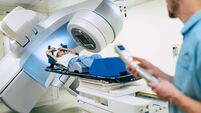Cancer knows no borders — neither should we

Ireland and Northern Ireland now punch above their collective weight in cancer research. Working together, we will be unbeatable.
As the Stormont Assembly and the various activities in Government Buildings wind down in the run-up to elections in May, concerns persist in relation to the Good Friday Agreement and the Northern Ireland protocol. But one initiative which grew out of the Good Friday Agreement continues to prosper and positively influence the lives of citizens on the island of Ireland.
On Sunday, October 3, 1999, a partnership was signed at Government Buildings in Stormont between the Departments of Health of Ireland and Northern Ireland and the world-renowned US National Cancer Institute (NCI) in Bethesda, Maryland, giving rise to the Ireland-Northern Ireland NCI Cancer Consortium.
















